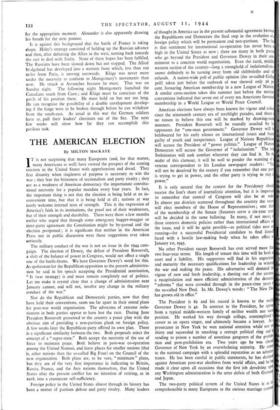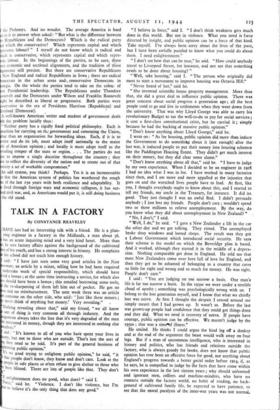THE AMERICAN ELECTION
By MILTON MAcKAYE
IT is not surprising that many Europeans (and, for that matter, many Americans as well) have viewed the prospect of the coming election in the United States with apprehension and dread. They fear disunity when singleness of purpose is necessary to win the war ; they fear the bitterness of sectionalism and party rivalry ; they see as a weakness of American democracy the importunate constitu- tional necessity for a popular mandate every four years. In fact, the important thing is not that the election is being held at an in- convenient time, but that it is being held at all ; nations at war rarely welcome internal tests of strength. This is the expression of America's faith in its institutions, the proof not of their weaknesses, but of their strength and durability. There were those a few months earlier who urged that through some emergency hugger-mugger or inter-party agreement the Constitution might be by-passed and the election postponed ; it is significant that neither in the American Press nor in public discussion were these suggestions ever taken seriously.
The military conduct of the war is not an issue in the 1944 cam- paign. The election of Dewey, the defeat of President Roosevelt, a shift of the balance of power in Congress, would not affect a single one of the battle-fronts. We have Governor Dewey's word for this. As spokesman for the Republican opposition to the present administra- tion he said in his speech accepting the Presidential nomination, "It (war strategy) is and must remain completely out of politics. Let me make it crystal clear that a change of administration next January cannot, and will not, involve any change in the military conduct of the war."
Nor do the Republican and Democratic parties, now that they have held their conventions, seem too far apart in their stated plans for post-war world organisation. The advocates of extreme isola- tionism in both parties appear to have lost the race. During June President Roosevelt presented to the country a peace plan with the obvious aim of providing a non-partisan plank on foreign policy. A few weeks later the Republican party offered its own plan. There is a significant similarity between the two. Both proposals reject the concept of a "super-state." Both accept the necessity of the use of force to maintain peace. Both believe in post-war cooperation among the United Nation, and leave places for smaller nations (that is, other nations than the so-called Big Four) on the Council of the new organisation. Both plans are, to be sure, " minimum " plans, but they are of the very first importance in indicating to Britain, Russia, France, and the Axis nations themselves, that the United States after the present conflict has no intention of retiring, as in 1918, into a crustacean self-sufficiency.
Foreign policy in the United States almost through its history has been a matter of partisan debate and party rivalry. Many leaders
of thought in America see in the present substantial agreement betvveei the Republicans and Democrats the final step in the evolution of foreign policy which will be permanent and non-partisan. The fat is that sentiment for international co-operation has never been % high in the United States as now ; there are many in both parties who go beyond the President and Governor Dewey in their corn. mitment to a concrete world organisation. Even the rural, middk. western section of the country—long a stronghold of isolationalism- seems definitely to be turning away from old shibboleths and old refusals. A nation-wide poll of public opinion (the so-called Gallop poll) taken just before the outbreak of war showed only 26 pe cent. favouring American membership in a new League of Nation A similar cross-section taken this summer just before the nationd conventions indicated that seven out of every ten Americans favoured membership in a World League or World Peace Council.
American elections have always been known for vigour and colt since the nineteenth century era of torchlight parades, and there no reason to believe this one will be marked by drawing-rota manners. President Roosevelt will be roundly assailed by his opponents for "one-man government." Governor Dewey will In belaboured for his early silence on international issues and found guilty of youth and inexperience. League of Nations Republic will accuse the President of "power politics." League of Natio Democrats will accuse the Governor of "isolationism." The Isolationists will seek comfort wherever they can find it. In midst of this clamour, it will be well to ponder the warning of veteran correspondent to his London newspaper readers: "Yo will not be deceived by the oratory if you remember that one parr! is trying to get in power, and the other party is trying to stay 11 power."
It is only natural that the contest for the Presidency sho receive the lion's share of journalistic attention, but it is importag to remember that control of Congress will also be at stake. In almost 5oo districts scattered throughout the country the voters will elect members of the House of Representatives ; one thud of the membership of the Senate (Senators serve a six-year term will be decided in the same balloting. In many, if not most, d these contests domestic policies rather than international affairs an the issue, and it will be quite possible—as political tides now running—for a successful Presidential candidate to find him faced with a hostile law-making body when he takes office January 1st, 1945.
No other President except Roosevelt has ever served more than two four-year terms. His length of tenure this time will be both asset and a liability. His supporters will find in his experie and maturity the necessary qualifications for leadership in wi the war and making the peace. His adversaries will demand Itt vigour of new and fresh leadership, a dusting out of the cornea a recapitulation and more efficient administration of the domestic " reforms " that were crowded through in the peace-time years the so-called New Deal. In Mr. Dewey's words: "The New has grown old in office."
The President is 62 and his record is known to the wor Governor Dewey is 42. In contrast to the President, he spa't from a typical middle-western family of neither wealth nor soc1..j position. He worked his way through college, contemplated 1 career as an opera singer, and ultimately became a lawyer. AS -prosecutor in New York he won national attention while not )s1 thirty and succeeded in smashing a corrupt political ring and sending to prison a number of notorious gangsters of the proh don and post-prohibition era. Two years ago he 'was elect Governor of New York by an overwhelming majority. He c to the national campaign with a splendid reputation as an adni trator. He has been careful in public statements, he has declar against American post-war aloofness from world affairs, and he made it clear upon all occasions that the first job devolving u any Washington administration is the utter defeat of both G and Japan.
The two-party political system of the United States is as comprehensible to many Europeans as the curious marriage cus the Ptolemys. And no wonder. The average America is hard It to it to answer when asked : "But what is the difference between e Republicans and the Democrats? Which is the radical party id which the conservative? Which represents capital and which. presents labour?" I myself do not know which is radical and hich is conservative, which represents capital and which repre- nts labour. In the beginnings of the parties, to be sure, there ere economic and sectional alignments, and the tradition of these ianments still persists. But there are conservative Republicans New England and radical Republicans in Iowa ; there are radical lernocrats in the urban areas and• conservative Democrats in ,eorgia. On the whole the parties tend to take on the colou: of 'eh. Presidential leadership. The Republicans under Theodore oosevelt and the Democrats under Wilson and Franklin Roosevelt Light be described as liberal or progressive. Both parties were inservative in the era of Presidents Harrison (Republican) and leveland (Democrat).
A well-known American writer and student of government deals th the problem lucidly thus: "Neither party has a rigidly fixed political philosophy. Each is achine for carrying on the government and cementing the Union, ther than an organisation for forwarding ideas. Each, if it is to vive and do its job, must adapt itself nationally to the major it of American opinion ; and locally it must adapt itself to the vailing temper of the state or region. . . . The parties do not st to impose a single doctrine throughout the country ; they st to reflect the diversity of the nation and to create out of that ersity a set of workable compromises."
An odd system, you think? Perhaps. Yet it is an incontestable that the American system of politics has weathered the rough s of the last 150 years with both resilience and adaptability. It lived through foreign wars and economic collapses, it has sur- .ed civil war, and, as Americans would put it, is still doing business the old stand.



























 Previous page
Previous page